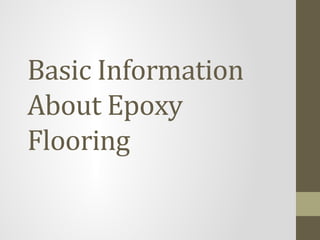
Basic information about epoxy flooring
- 2. Introduction • It’s no secret that the quality of the floor under your feet is crucial in most commercial and industrial situations. Not only does it have to look great, but it also must be durable, strong and completely safe. Epoxy flooring is one alternative that’s being used more and more in a wide range of scenarios. • Here is some basic information to help get you up to speed and show you the benefits of this unique flooring product.
- 3. What Is It? • Most people have probably heard of epoxy floors, but not everyone knows what it is. Basically, epoxy flooring contains several layers of hardeners and resins that must equal a depth of two millimeters to be considered an official ‘epoxy floor.’ Anything less than that is just a coating. • According to Vanguard Concrete Coating, the chemical components consist of a base and a curing agent that mix together and react with one another to form a hard, protective ‘plastic’ like exterior.
- 4. What Are the Different Types? • Since different situations require different flooring characteristics, there are different types of epoxy flooring to match.
- 5. What Are the Different Types? Here are the most common types of epoxy floors and their main qualities: • Self-Dispersing – good for high-traffic areas because they are strong and durable. • Self-Dispersing with Quartz – has the same strength as a regular self-dispersing floor, but the quartz creates an anti-slip quality. • Self-Leveling – these floors work well for rooms like the kitchen because they are easy to clean. • Epoxy Flaked – this is standard epoxy flooring with flakes or chips added into the mix for decoration. • Mortar Epoxy Flooring – this floor is the strongest of all the different types of epoxy floors, and should be used in heavy industrial areas. • Graveled Epoxy Floors – these are the most complex type of floors, and the most decorative. They also have good anti-slip elements.
- 6. Where Can I Use It? Epoxy flooring isn’t only reserved for big industrial spaces. According to Hi-Tech Engineers, you can use epoxy successfully in a number of different places and situations, including: • Industrial plants • Retail stores • Laundry rooms • Warehouses • Hospitals • Shopping malls • Restaurants • Home garages • Kennels • Kitchens • Basements • Showrooms • Loading docks • Walkways
- 7. Benefits of Epoxy Flooring Some of the benefits that users of epoxy flooring experience, include: • Safety – anti-slip properties in several of the floors will help everyone stay on their feet where they belong. • Versatility – the colors and patterns available will suit most people’s tastes, so no one has to go without an epoxy floor. • Affordability – the strength ad durability of epoxy flooring allows it to last for years, which means you won’t have to get it replaced for years. The wide selection also means you’re more likely to find one that fits your budget. • Convenience – epoxy flooring is easy to clean, so spills and dirt will wipe away without having to take too much time or effort doing it.
- 8. Extra Information Here is some added information about epoxy flooring, as provided by Vanguard Concrete Coating, • UV light and especially direct sunlight will cause epoxy coatings to yellow or chalk. Choosing a darker epoxy may help combat this issue. • Complete curing of the epoxy resins may take up to several days. They will seem hard within hours or even minutes, but that isn’t the end of the show.
- 9. Extra Information • Typically, epoxy flooring is too thick to apply and will cure too slowly in temperatures lower than 50 or 60 degrees F. Ideal installation temperatures range from 65 to 85 degrees F. • For the most part, you get what you pay for with epoxy flooring. You can find cheaper flooring, but it is often diluted with other substances that affect the integrity of the finished floor. • The ideal time to add a second coat of epoxy is within 48 hours of the first coat. This ensures the second coat will partially fuse to the first, rather than just form a mechanical bond.
- 10. Extra Information • Typically, epoxy flooring is too thick to apply and will cure too slowly in temperatures lower than 50 or 60 degrees F. Ideal installation temperatures range from 65 to 85 degrees F. • For the most part, you get what you pay for with epoxy flooring. You can find cheaper flooring, but it is often diluted with other substances that affect the integrity of the finished floor. • The ideal time to add a second coat of epoxy is within 48 hours of the first coat. This ensures the second coat will partially fuse to the first, rather than just form a mechanical bond.
